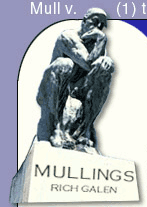|
|

|

Become a
Paid Mullings Subscriber!
(To join the FREE mailing list or to unsubscribe Click Here
How an Adage is Born
Rich Galen Friday May 20, 2005
From Ft. Bragg
Fayetteville, NC
There is an old adage in Your Nation's Capital which states:
"Any reform will have exactly the reverse of its intended effect: It will turn a problem into a crisis and a crisis into a disaster."
Ok. That is not an old adage. I just made it up. But it is, nevertheless, true.
The current crisis-trending-toward-disaster over the filibuster of judicial nominees is the direct result of the campaign finance laws which were designed to solve the problem of soft money in the federal political process.
If you remember our Con Law lesson from the other day, the First Amendment gives Americans the right to "petition the Government for a redress of grievances."
In modern America a "grievance" is anything the government is doing to you (or your industry or your strongly held belief) which (a) causes you do things you don't want to do; or (b) forbids you from doing things you do want to do; or (c) having to report anything you are doing or not doing on an official form which your competitors (or competitors) are allowed read.
In late 20th Century America a "petition" was delivered in the form of a check with an amount including multiple commas and many zeros delivered to one or another of the national political committees with a nice note insuring the makers of laws and the issuers of regulations knew exactly from whom the "petition" had been received.
This was what became known as soft money.
The problem with soft money wasn't that it was deliverable in unlimited amounts; but that it was delivered to Republican and Democratic national committees who had a direct pipeline to Members of the House and Senate (the makers of laws) and, depending upon who sat in the Oval Office, high-level members of the Administration (the issuers of regulations).
The conduit for this soft money, the Washington lobbyists, made their money delivering these petitions, then following up with the appropriate makers and issuers with in-person visits to make certain that the particular "grievance" was being adequately "redressed."
This highly evolved process worked equally well for Big Business, Big Labor, Big Liberal and Big Conservative Organizations.
At the time, the proponents of campaign finance reform claimed that soft money was a problem which had to be fixed, so they made it illegal for political parties to troll for, accept, or spend it.
Those who were opposed to the law claimed that soft money would still find its way into the process, but it would flow through (and get stuck to) political hands over whom (unlike the major Democratic or Republican committees) neither Members of the House and Senate nor the Administration have any control, thus turning a problem into a potential crisis.
Soft money is now only available to interest groups who are free to run commercials on radio and television, buy pop-up ads on your computer screen, send mail to your home, and make phone calls during dinner like a series of howlers from Mrs. Weasley that the world as you know it will absolutely and immediately end if President Bush's judges are either confirmed or filibustered, depending upon whose list you find yourself.
Because these groups have learned that - as George Orwell taught us in 1984 - donors need an easily identifiable enemy, the arguments don't have to be particularly well-reasoned for thoughtful cocktail conversation, but must be very well-researched to deliver the biggest emotional zetz for the buck.
The calls to action - call, write, e-mail your Senator demanding � whatever - are not tempered by the national and longer-term interests of the national parties. They are driven by the need to have a fight RIGHT NOW because fights generate donations.
Reforming the problem of soft money led to the crisis of outside interest groups taking over the national political debate which has led directly to the pending disaster of the filibuster fight in the US Senate.
Thus, is an old adage born.
On the Secret Decoder Ring page today: The Actual Webster's definition of the word, "adage," as well as the unofficial definition of the word, "zetz" which I expect you to use in a sentence for the rest of the day; a wonderful Mullfoto and the required Catchy Caption of the Day.
--END --
Copyright © 2005 Richard A. Galen
Current Issue |
Secret Decoder
Ring | Past
Issues | Email
Rich | Rich
Who?
Copyright �2002 Richard
A. Galen | Site design by Campaign
Solutions. | |
|







